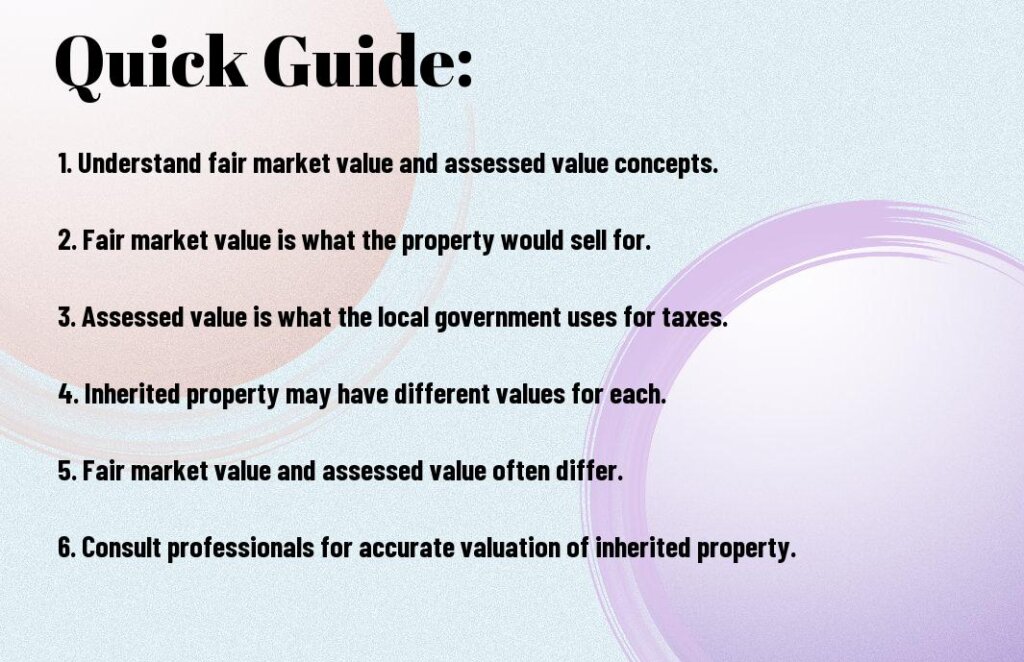
Many individuals who inherit property may find themselves in a conundrum when it comes to determining the value of the property. It is vital to distinguish between fair market value and assessed value, as these two terms often cause confusion. Fair market value is the price the property would sell for on the open market, while assessed value is what the local government uses to calculate property taxes. In this comprehensive guide, we will research into the differences between fair market value and assessed value for inherited property, providing clarity on how each value is determined and its implications for heirs.
Key Takeaways:
- Fair market value: Fair market value is the price a willing buyer and a willing seller would agree upon for the property, and it can differ from the assessed value.
- Assessed value: Assessed value is the value assigned to the property by the municipal or county assessor for tax purposes and may not always reflect the fair market value.
- Inherited property: Inherited property may have a different fair market value than the assessed value due to factors such as market conditions, renovations, or improvements made after assessment.

Fair Market Value for Inherited Property
Definition and Explanation
One of the key concepts to understand when dealing with inherited property is the fair market value. The fair market value is the price at which the property would change hands between a willing buyer and a willing seller, with neither being under any compulsion to buy or sell.
Factors Influencing Fair Market Value
Explanation of the fair market value of inherited property is crucial for estate planning and tax purposes. Factors that can influence the fair market value include the current real estate market conditions, the location of the property, the property’s physical condition, any improvements made to the property, and recent comparable sales in the area.
- The fair market value can also be affected by any restrictions on the property, such as zoning laws or easements.
- Recognizing these factors is imperative for accurately determining the fair market value of inherited property.
Other Articles You Might Enjoy:
- How to Sell a Probate House in Texas in 2025
- How to Price Your Inherited Home in Houston: A Complete Guide
- Did You Inherit a House with a Mortgage? Learn Your Options
- Inheriting A Property in Texas: Laws, Probate & Options
- 5 Essential Steps to Sell Your Inherited Manufactured Home in Texas
Another Perspective on Factors Influencing Fair Market Value

The fair market value of inherited property can also be influenced by emotional factors, such as sentimental value or family history associated with the property. It is important to take a comprehensive approach when evaluating the fair market value, considering both tangible and intangible aspects of the property.
- Another consideration is the demand for similar properties in the market, which can impact the fair market value of inherited property.
- Recognizing these factors is crucial for accurately determining the fair market value of inherited property.
Assessed Value and Its Implications
Definition and Explanation
Now, when looking at the difference between assessed value and fair market value for inherited property, it’s important to understand what assessed value entails. Assessed value is the value placed on a property by a public tax assessor for the purpose of determining property taxes. It is typically calculated using a set formula or method specific to each jurisdiction, taking into account factors like the property’s condition, size, location, and improvements.
Role in Property Taxes
Now, the assessed value of inherited property plays a significant role in determining the property taxes that will be owed on the property. Property tax rates are applied to the assessed value to calculate the amount of taxes due. This means that a lower assessed value could result in lower property taxes, while a higher assessed value could lead to higher taxes.
Explanation: Tackling the assessed value of inherited property requires a clear understanding of how it influences property tax obligations. It is crucial to keep in mind that assessed value is not always the same as fair market value, and discrepancies between the two can impact the financial responsibilities associated with the property.
How Do You Determine the Fair Market Value of Inherited Property?
Step-by-Step Guide to Determining Property Value
| Fair Market Value | Assessed Value |
| Based on current market conditions and what a buyer is willing to pay. | Value assigned by a municipality or county for tax purposes. |
| Usually determined by a professional appraisal or comparative market analysis. | May not reflect the true value of the property due to limitations in assessment methods. |
Tips for Establishing Fair Market Value
- Research recent sales of similar properties in the area.
- Consider hiring a certified appraiser for an accurate valuation.
- Take into account any unique features or improvements that add value to the property.
This will ensure you have a comprehensive understanding of the property’s true worth when determining fair market value. Bear in mind, fair market value is crucial for pricing the property accurately for a sale or inheritance purposes.
Methods to Verify Assessed Value
Tips for verifying the assessed value include checking the assessment records with the local assessor’s office, reviewing the assessment methods used, and comparing the assessed value with similar properties in the area. This can help determine if the assessed value aligns with the property’s actual worth.
Step-by-Step, it is vital to verify the assessed value through thorough research and comparison to ensure fairness and accuracy in property valuation. This can also help in identifying any discrepancies in the assessed value that may need to be addressed or appealed.
Comparing Fair Market Value and Assessed Value
Key Differences and Types of Valuations
| Fair Market Value | Assessed Value |
| Based on what a willing buyer would pay a willing seller | Used by local governments to calculate property taxes |
| Determined by market conditions | Determined by tax assessors |
| Can fluctuate with the real estate market | Often lower than fair market value |
| Used in real estate transactions | Used for taxation purposes |
| Requires appraisal by a licensed professional | Can often be challenged by property owners |
Pros and Cons: Impact on Inheritance
On the one hand, assessing inherited property at fair market value can provide a more accurate reflection of its worth, potentially affecting inheritance amounts positively. Conversely, using assessed value may result in lower taxation for beneficiaries. Ultimately, the choice between fair market value and assessed value depends on the specific circumstances of the inherited property.

Why Sell Your House To TX Cash Home Buyers?
1. You Pay Zero Fees
2. Close Quickly or the date of your choice
3. Guaranteed Offer
4. No repairs required, we buy as is
5. Less Hassles!
Call Now (281) 595-7550 Send Text
Pros and Cons: Impact on Inheritance
| Pros | Cons |
| Reflects current market conditions | Higher tax implications |
| Provides a more accurate valuation | May lead to disputes with tax authorities |
You need to consider the implications of choosing fair market value or assessed value carefully when dealing with inherited property.
Final Words
With this in mind, it is important to understand the distinctions between fair market value and assessed value when dealing with inherited property. While assessed value is used for property tax purposes by local governments, fair market value determines the price at which a property could be sold between a willing buyer and seller in the open market. It is crucial to accurately determine the fair market value of inherited property, as this will impact any potential taxes owed on the property and any future sales. Seeking the expertise of a professional appraiser or real estate agent can help ensure that the fair market value is determined accurately, providing clarity and protection during the inheritance process.
FAQ
Q: Is fair market value different from assessed value for inherited property?
A: Yes, fair market value and assessed value are two different concepts when it comes to inherited property. Fair market value is the price that the property would sell for on the open market, while assessed value is the value assigned to the property by a tax assessor for the purpose of calculating property taxes.
Q: How is fair market value determined for inherited property?
A: Fair market value for inherited property is typically determined by conducting a market analysis that takes into account factors such as the property’s location, size, condition, and recent sales of similar properties in the area. It is important to obtain a professional appraisal to accurately determine the fair market value of inherited property.
Q: Can the assessed value of inherited property be used as an indicator of its fair market value?
A: While the assessed value of inherited property can provide a rough estimate of its value, it is not a reliable indicator of fair market value. Assessed values are often based on outdated information and do not take into consideration the specific attributes of the property that can affect its market value. It is recommended to rely on a professional appraisal for an accurate determination of fair market value.
Disclaimer:
The content provided on this blog is for informational purposes only. We are not attorneys or tax professionals. For personalized legal or tax advice, please consult with a qualified professional.
Written by Lisa Martinez, Founder of TX Cash Home Buyers

About The Company
TX Cash Home Buyers helps Texas homeowners sell quickly and simply — even in tough situations like repairs, inherited homes, or financial stress. Founded by Lisa Martinez, we’re known for our local experience, fair offers, and commitment to guiding sellers through off-market sales with clarity and care.




